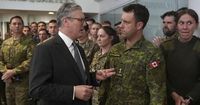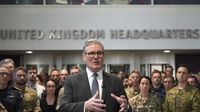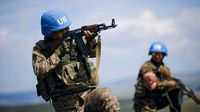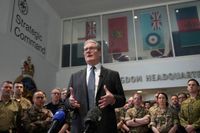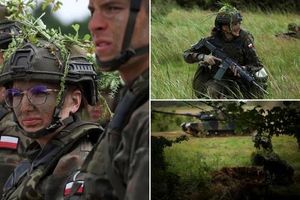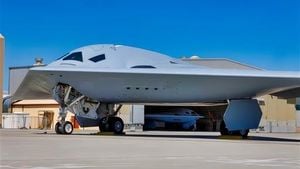In a significant move to ensure the security of Ukraine amidst the ongoing conflict with Russia, UK Prime Minister Keir Starmer convened a meeting on March 20, 2025, with military officers from around 30 countries in Northwood, near London. The meeting was part of the efforts to solidify plans for a so-called "coalition of the willing" aimed at establishing an international peacekeeping force for Ukraine as negotiations over a possible partial ceasefire continue.
Starmer stated, "We are making steps in the right direction" and emphasized that the planning for any potential peace deal must not wait until after a ceasefire is announced. He warned, "A deal without anything behind it is something that [Russian President Vladimir] Putin will breach." This sentiment was echoed by French President Emmanuel Macron, who confirmed that a meeting of this coalition would take place the same day in Paris, including Ukraine’s President Volodymyr Zelensky.
While these diplomatic efforts are taking shape, skepticism remains regarding the viability of the coalition. Con Coughlin, defense and foreign affairs editor of The Telegraph, expressed doubts about the practicality of Starmer's plans, stating that the "coalition of the willing" is ultimately doomed to failure. He quoted Italian Prime Minister Giorgia Meloni, who described sending European peacekeeping troops to Ukraine as "risky, complex, and ineffective." This reinforces the critical view that many European nations are hesitant to commit substantial military resources.
Starmer's Armed Forces Minister, Luke Pollard, underscored that any successful deployment would be heavily reliant on United States support, stating explicitly, "The UK government is not willing to put British troops in Ukraine if the US walks away." The lack of commitment from the US raises significant concerns, as President Donald Trump has shown little inclination to engage in international efforts concerning Ukraine.
Keith Bennett, a senior international affairs analyst, noted that Starmer's rollbacks in proposals signal a lack of support. He remarked, "Starmer can call people together to talk, but actual commitment is lacking." This notion occurs amidst the backdrop of ongoing discussions about the feasibility of a peacekeeping force that could stabilize the situation on the ground.
Amid these high-level discussions, Alex Gordon, president of the RMT trade union, characterized Starmer's military posturing as a "desperate gamble" designed to enhance his political stature. He criticized the notion that military investments would somehow lead to a war economy that benefits the UK, deeming such claims disingenuous.
Alan Freeman, co-director of the Geopolitical Economy Research Group, warned that the push for a coalition could inadvertently escalate tensions rather than contribute to peace. He noted, "The Europeans' warmongering against Russia has rebounded because they're losing … so warmongering is now the only recourse they have … And it's very dangerous." His insights reflect growing concerns that without careful diplomacy, international responses could further inflame the conflict.
In related developments, negotiations between Russia and Ukraine regarding a potential ceasefire took a tentative step forward with an agreement in principle announced separately. However, the specifics of any ceasefire remain uncertain, with ongoing accusations of violations seen in the overnight drone attacks on both sides. In one instance, Kropyvnytskyi suffered its most intensive attack of the war, resulting in injuries and significant damage.
New Zealand Defence Minister Judith Collins remarked on the nation's role in supporting diplomatic efforts, stating that they continue to stand firm with Ukraine and emphasize the necessity of a coherent and achievable ceasefire strategy. However, she also clarified that New Zealand has not committed to any specific actions thus far.
The United States continues to play a pivotal role, especially amid Trump's direct communications with both sides. Reports indicated that negotiations involving US diplomats would meet in Riyadh, Saudi Arabia, with expectations of enforcing any agreed ceasefire through a potential UN peacekeeping mandate. Nonetheless, Zelensky has expressed skepticism regarding the adequacy of UN troops to provide security, declaring that, "a UN mandate is no realistic alternative" to the need for stronger foreign military support.
Despite these complexities, the general consensus remains that the success of any proposed peacekeeping efforts hinges not just on optimistic plans, but rather on substantial military commitments and unified support among the coalition nations. UK officials further estimate that up to 30,000 troops may be necessary to maintain peace along a fractious front line, with some analysts suggesting that as many as 100,000 troops would be needed in ongoing rotations.
The responsibility now rests on European nations to respond decisively, as Starmer articulated the urgency for a united European front against potential Russian aggression. "Either Europe stands united, or it risks breaking under Putin's strategy," he stated, framing the coalition as a crucial tipping point in ensuring stability and peace in the region.
With essential discussions set to take center stage, particularly in upcoming meetings across Europe and the US, the eyes of the world remain fixed on how these diplomatic maneuvers will unfold. The calls for a credible plan that balances military deterrence with the foresight necessary for sustainable peace will resonate long after the meetings conclude.
